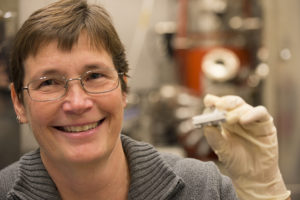
Christine Floss, research professor in the Department of Physics in Arts & Sciences at Washington University in St. Louis, died April 19, 2018, in St. Louis. She was 56.
Floss was a leader in the university’s Laboratory for Space Sciences. Her research focused on using extraterrestrial material such as meteorites, lunar rocks and interplanetary dust to illuminate the origin and evolution of the early solar nebula. She served as a research adviser to several graduate students and was recognized with the 2014-15 Outstanding Faculty Mentor Award. She also mentored undergraduate students.
“Christine was a highly regarded and successful principal investigator on numerous NASA research proposals, particularly ones involving innovative research using state-of-the-art technologies such as nanoscale isotopic and elemental analysis,” said Thomas J. Bernatowicz, professor emeritus of physics.
“In all of these endeavors, she was cherished as a thoughtful, kind and talented colleague,” Bernatowicz said. “Not only was she one of the few women serving as a research professor in the physics department, but she also devoted her energies to the promotion of women in STEM fields at the university.”
Floss earned a bachelor’s degree in German at Purdue University in 1983 and a bachelor’s in geology in 1987 from Indiana University. She earned her PhD in geochemistry at Washington University in 1991. Her thesis work focused on understanding the origin and formation of moon rocks known as ferroan anorthosites and an unusual group of enstatite meteorites known as aubrites.
“She was definitely one of our best students, and I wondered how she managed to complete her PhD in only four years while at the same time raising two young girls,” said Ghislaine Crozaz, her PhD adviser. “The answer is simply superb organization, which she also demonstrated later by organizing a workshop highlighting the career of my husband, the late Robert M. Walker, as well as the memorial in his honor.”
Floss then spent five years as a research scientist at the Max-Planck-Institut für Kernphysik in Heidelberg, Germany. She returned to Washington University as a research scientist in 1996 with her husband and colleague, Frank J. Stadermann, and was named research associate professor in 2006.
Floss was preceded in death by her husband, Stadermann, also a member of the Laboratory for Space Sciences. After his death, she increasingly focused her research on the use of isotopes to study a variety of primitive solar system materials, was promoted to research professor, and participated in the 2014-15 Antarctic Search for Meteorites expedition.
In her private life, she was an avid member of the Ethical Society of St. Louis, dedicated time to assisting in medical missions in Haiti, and was a devoted mother and grandmother. She was passionate about the outdoors, reading and world travel, and she gave generously to others in every aspect of her life.
She is survived by her three daughters, Alisha Erin (Jeff) Hillam of Westford, Mass.; Ashley Heavilon of Seattle, Wash.; and Amanda Stadermann, a 2016 graduate of Washington University and a PhD candidate at the University of Arizona’s Lunar and Planetary Laboratory; three grandchildren; parents, Heinz and Inge Floss of Bellevue, Wash.; brothers Peter (Barbara) Floss of Littleton, Mass., and Helmut Floss of Carnation, Wash.; and sister Hanna Floss (Tony Andrews) of Bellevue, Wash.
A memorial service will be held at 2 p.m., Wednesday, April 25, at the Ethical Society of Saint Louis, 9001 Clayton Road.
In lieu of flowers, donations in her memory may be made to the Ethical Society of Saint Louis or Friends of the Children of Haiti. For more information about Floss’ life and scientific contributions, see the Meteoritical Society’s memoriam.